|
|
|
Sort Order |
|
|
|
Items / Page
|
|
|
|
|
|
|
| Srl | Item |
| 1 |
ID:
086165


|
|
|
|
|
| Publication |
2009.
|
| Summary/Abstract |
The epidemic of piracy off the coast of Somalia since 2007 included the spectacular pirating in November 2008 of the Saudi supertanker Sirius Star containing a quarter of Saudi Arabia's daily oil production; the ship was released on 10 January 2009 in exchange for a $3 million ransom. The epidemic has led to extensive media commentary, a flurry of UN Security Council resolutions, and deployment of an unusual combination of some of the world's most powerful navies to escort commercial ships through one of the world's busiest, and now most dangerous, shipping lanes.
Predictably, policymakers, pundits and politicians have sought to harness the piracy story to advance their own agendas. Many have seized on it to plead for a durable political solution to the 19-year crisis of state collapse in Somalia. This is a waterborne variation on the 'securitisation' of state-building, the argument that failed states pose a host of spillover dangers, including piracy, if left unresolved. Humanitarians have contrasted the robust international anti-piracy response with the tepid global mobilisation to address Somalia's horrific humanitarian crisis, in which three million Somalis are in need of emergency aid. Some apologists have cast Somali piracy in 'Robin Hood' terms, as a legitimate local response by poor coastal fishing communities against external predators engaged in illegal fishing and toxic-waste dumping in their waters. More than a few journalists have framed the Somali piracy story as another example of 'Mad Max anarchy' prevailing in the hopelessly ungovernable place called Somalia. Still others warn that it is only a matter of time before the pirates fire on a ship laden with chemicals or fuel, producing an environmental disaster on Somalia's shoreline. And counter-terrorism experts have expressed concern over a 'terrorism-piracy nexus' in which some of the tens of millions of dollars of ransom money flowing into Somalia are being garnered by the al-Qaeda affiliate in Somalia known as al-Shabaab. What all of these perspectives share is the claim that Somali piracy is only a symptom of a much bigger political problem on land.
|
|
|
|
|
|
|
|
|
|
|
|
|
|
|
|
| 2 |
ID:
114190
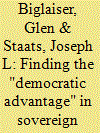

|
|
|
|
|
| Publication |
2012.
|
| Summary/Abstract |
Much scholarship in the political economy literature has investigated the influence of the democratic advantage on sovereign bond ratings by credit rating agencies (CRAs). Missing from earlier work, however, is inquiry into the effects on bond ratings of factors that lower political risk, such as adherence to the rule of law, the presence of a strong and independent judicial system, and protection of property rights. Using panel data for up to thirty-six developing countries from 1996 to 2006, we find that rule of law, strong and independent courts, and protection of property rights have significant positive effects on bond ratings. Policymakers wanting to obtain higher bond ratings and increased revenue from bond sales would do well to heed the message contained in these findings.
|
|
|
|
|
|
|
|
|
|
|
|
|
|
|
|
| 3 |
ID:
124788
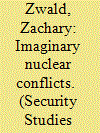

|
|
|
|
|
| Publication |
2013.
|
| Summary/Abstract |
Although the question of how policymakers arrive at their nuclear doctrine and force structure preferences is one of unparalleled importance, it has not received systematic attention in international relations. This article, therefore, develops and illustrates a behavioral model of nuclear deterrence preference formation wherein variation in such preferences is a function of the content and flexibility of one's theory-driven thinking. A policymaker determines the value of potential doctrine and force structure positions in the context of his or her beliefs about the nature of how nuclear conflict will likely begin and proceed-i.e., whether more as a result of rational and deliberate action or due to fear, misperception, and accident. This analysis challenges the dominant explanations of doctrine and force structure preference formation that are implicit in IR. It suggests how the dialogue of the deaf in domestic debates over nuclear weapons policy can be reduced in the future and provides new criteria by which to recast the proliferation optimist-pessimist debate.
|
|
|
|
|
|
|
|
|
|
|
|
|
|
|
|
| 4 |
ID:
171507
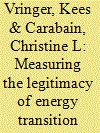

|
|
|
|
|
| Summary/Abstract |
In line with the Paris Agreement, the Dutch Government aims to achieve 49% CO2 emission reduction by 2030. The required energy transition will have a large impact on Dutch society. So, it is important that citizens and companies support and agree on the required policies. This paper explores the legitimacy of these policies and how to measure the degree of such legitimacy.
A survey among Dutch citizens and company representatives shows support for the emission reduction policy goals (input-legitimacy). We also explored support for two specific policy interventions (output legitimacy): 1) an ‘in-home display’, collectively paid for by all energy consumers, and 2) an in-home display that is paid for by the energy companies. Both interventions are supported by around 50% of the citizens and companies. We found strong correlations between underlying aspects of legitimacy (related to good governance criteria) and the overall support for the interventions. We also found that public support for a policy goal does not automatically result in support for the associated intervention. This emphasizes the importance of ex-ante testing of specific interventions to determine the level of public support, so that policy can become more effective and efficient.
|
|
|
|
|
|
|
|
|
|
|
|
|
|
|
|
| 5 |
ID:
128200
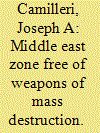

|
|
|
|
|
| Publication |
2013.
|
| Summary/Abstract |
What is needed is a multi-layered dialogue to engage a critical mass of policy-makers, opinionmakers and civil society from across the ME's political and socio-cultural spectrum.
|
|
|
|
|
|
|
|
|
|
|
|
|
|
|
|
| 6 |
ID:
114723
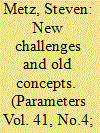

|
|
|
| 7 |
ID:
118366


|
|
|
|
|
| Publication |
2013.
|
| Summary/Abstract |
The relationship between intelligence analysis and policy decisions is a contentious one with both policymakers and intelligence analysts frequently expressing frustration over its underlying dynamics and with each faulting the behavior of the other. This article examines one aspect of this relationship, the manner in which intelligence analysis can become politicized. Rather than view politicization as an aberration it is treated here as a normal feature of intelligence analysis. A typology of politicization organized around the concepts of hard and soft politicization is presented and illustrated with historical examples from the American experience with intelligence analysis.
|
|
|
|
|
|
|
|
|
|
|
|
|
|
|
|
| 8 |
ID:
154325


|
|
|
|
|
| Summary/Abstract |
examines the roles of intelligence officers who present the President’s Daily Brief to the nation’s most senior policymakers. He argues that these officers add to the political landscape by contextualizing meta-information, that is, information about information, that only they can acquire and convey. He concludes that PDB briefers operate as a parallel organization to the intelligence community.
|
|
|
|
|
|
|
|
|
|
|
|
|
|
|
|
| 9 |
ID:
171342
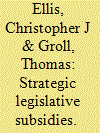

|
|
|
|
|
| Summary/Abstract |
We analyze the strategic considerations inherent in legislative subsidies and develop an informational lobbying model with costly policy reforms. In contrast to other models of informational lobbying, we focus on the implications of a policymaker’s and a lobby’s resource constraints for lobbying activities. We allow both a policymaker and a lobby to gather information, and each can either fund or subsidize policymaking. Our analysis highlights that legislative subsidies are both chosen strategically by lobbyists and strategically induced by policymakers, dependent on the circumstances. These involve which resource constraints bind the policymaker’s prior beliefs, the salience of policy, and the policymaker’s and lobby’s expertise in information gathering. Our results highlight five distinct motives for informational lobbying and demonstrate that for both a lobby and policymaker, there can be strategic advantages arising from being resource-constrained.
|
|
|
|
|
|
|
|
|
|
|
|
|
|
|
|
|
|
|
|
|